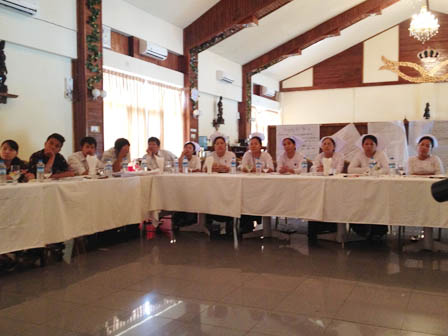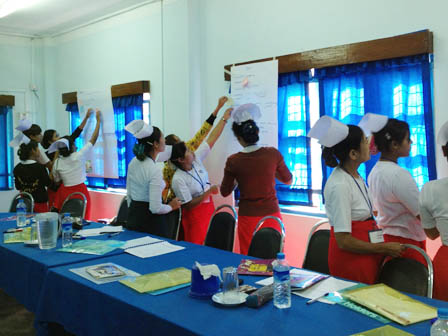Midwives do more than just deliver babies. They carry out other vital life-saving tasks like reproductive health information and services, including antenatal, postnatal care and family planning. The world needs midwives now more than ever, especially in regions affected by conflict such as Myanmar’s Rakhine State, where it is estimated that 150,000 internally displaced people are dependent on humanitarian organisations for basic medical care.
In Rakhine State UNFPA remains committed to supporting both humanitarian organizations and building the capacity of the government services to provide a complete package of women’s health for both Rakhine and Rohingya populations. This includes helping survivors of gender based violence (GBV). Working closely with Rakhine State government authorities, UNFPA conducted two training sessions in Rakhine state in March 2014 to further build the government’s capacity to deliver quality healthcare for survivors of gender-based violence. These sessions were designed to help government midwives, nurses, and doctors better understand the issue of gender-based violence and to be able to provide effective clinical management of rape.
In many places women may only access healthcare services when they are pregnant, so midwives are also key actors in identifying and treating survivors of gender-based violence including intimate partner violence and sexual violence. UNFPA has supplied non-governmental healthcare organizations and government hospitals with post-rape kits containing needed Post-Exposure Prophylaxis (PEP), emergency contraception, and drugs needed to treat sexually transmitted infections.

Over 40 midwives from Sittwe, Maungdaw, and Buthidaung townships were sensitized on the concept of gender-based violence, focused on describing how the violence occurs and giving them the skills to practice survivor-centered communications to support the healing process of victims of such violence.

The training was well-received by the participants who described in evaluations that they felt more confident to be able to apply the guiding principles of respect, non-discrimination, safety and security, and confidentiality. They said they were also able to treat survivors with dignity and respect as well as being able to effectively conduct examinations and offer a range of services. One midwife at Sittwe General Hospital said the training made her and her colleagues more committed to medical ethics and respecting the rights of patients to receive quality healthcare without discrimination.
However, ongoing problems in Rakhine State means there is still a long way to go in ensuring quality international standard reproductive health care there. UNFPA together with the Myanmar Medical Association (MMA) and Myanmar Nurse and Midwife Association (MNMA) ensure that all couples regardless of their race or religion are able to obtain reproductive health care as well as decide freely the number and spacing of pregnancies.
The International Day of the Midwife is observed globally on 5 May 2014. This year's theme is “midwives changing the world one family at a time."


